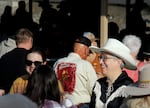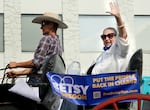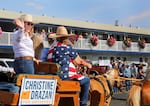Every year, people from all over the world gather in Pendleton, a city of 17,000 in northeastern Oregon, for the Pendleton Round-Up, one of the largest rodeo events in the country.
With that in mind, all three candidates to be Oregon’s next governor trekked to Pendleton last week to mingle with potential voters.
As upwards of 50,000 people and their animals descend upon the city each year, so too do political candidates from across Oregon, eager to increase their exposure before the next election. This practice has lasted for decades but has taken on added importance this year.

Democratic gubernatorial candidate Tina Kotek chats with voters at the Pancake Breakfast, a tradition at the Pendleton Round-Up, on Sept. 16, 2022.
Joni Land / OPB
That’s because this year’s race to replace Democratic Gov. Kate Brown at the end of her final term could be the closest contest in years, with three candidates — Democrat Tina Kotek, Republican Christine Drazan and unaffiliated candidate Betsy Johnson — vying for support.
Kotek and Johnson made an appearance at the Cowboy Breakfast, where hundreds of people lined up on a frigid Friday morning as country music played gently in the background.
While Brown sat relaxed eating pancakes, the current candidates seemed more focused on wooing potential votes, weaving between tables and talking about the issues. Their presence lacked subtlety, as staffers wore bright campaign shirts amid the western flair.
Johnson leaned on her experience representing a rural district in Clatsop County, west of the Cascades.
“I am conversant in the vocabulary of rural Oregon,” she told OPB. “All of Eastern Oregon can vote one way on a ballot measure or a candidate and it can get wiped out by Multnomah County.”
Kotek, sporting a pristine black western shirt and off-white cowboy hat, said she’s been to Pendleton multiple times during her campaign, and that she believes a Democrat has a chance to pick up votes in an area where conservative candidates routinely have dominated.
“I’ve been to many parts of our state in the campaign,” Kotek said. “We’re all more successful when the whole state is successful. So I think there’ll be some people out here who will vote for me.”
Candidates also rode in the Westward Ho! Parade, attaching campaign signs to 19th Century-style carriages as they made their way throughout downtown Pendleton, packed crowds of spectators cheering on either side.
Drazan, speaking outside her carriage, said issues like addiction and rising homelessness were affecting rural Oregon in much the same way as urban parts of the state.
“If you’re in a rural community, the impacts can be seen fast,” Drazan said. “It feels like it’s new (in rural areas).”
The political glad-handing at the Round-Up could prove more important this year than normal. The Cook Political Report recently labeled Oregon’s gubernatorial race as “a toss-up,” and some election experts say the state could see its first non-Democratic governor since Vic Atiyeh in the 1980s. The race’s potential close outcome would be a stark contrast to 2018 when Brown won by 7 percentage points.
Rural Oregon counties, especially in the eastern half of the state, traditionally have not swayed many statewide elections. But if the race is tight this year, they could make a difference.

Independent gubernatorial candidate Betsy Johnson waves to crowds at the Pendleton Round-Up on Sept. 16, 2022.
Joni Land / OPB
Daniel Costie, an assistant professor of public administration at Eastern Oregon University, said conservative strongholds like Pendleton have opportunities for all candidates. Drazan, he said, wants to ensure conservative Eastern Oregon voters turn out to vote while Johnson and Kotek are trying to eat into those margins.
Locals speaking to OPB said they were happy candidates took the time to meet with Pendleton residents and talk. Most voters said they still hadn’t decided who they were voting for. Some were split between Johnson and Drazan.
Nearly all, though, said they felt rural Oregon, especially the eastern half, was not well represented in Salem. It’s been nearly 80 years since voters elected a governor from east of the Cascades.
“They need to get out and see the people,” said Sharon Livingston, a rancher in Grant County. “We are so low on population that we do not get representation.”
Round-Up gets more political
The Round-Up has been a constant thread in Mike Thorne’s life.
Thorne remembers the anxiety he felt as a first grader, waiting for his parents to pick him up for school so he could go to the Round-Up. His father was a Round-Up president and Thorne would eventually go on to join the event’s board of directors. His son competed at the rodeo and his daughter was a member of the Round-Up court.
He also built a political career, representing Pendleton in the state Senate from 1972 to 1991. Thorne said when he rode in the Westward Ho! Parade after he was elected, he did so more as a community member than a local lawmaker.

Republican gubernatorial candidate Christine Drazan waves to crowds at the Pendleton Round-Up.
Joni Land / OPB
“Round-Up was kind of a part of everything we did, so riding in the Round-Up parade was just assumed to be part of the association and outreach with people,” he said.
He can’t help but notice, though, how that tenor has changed. Campaigns are more overt, and the Round-Up to him generally seems far more political than it once was. Thorne said it feels like candidates treat it as just another stop on the campaign trail, rather than attending in the spirit of the event.
“Doing something that had a political sign was not really, at that time, seen as being consistent with that original tradition,” he said. “Over time, clearly that has changed.”
It’s not just the presence of candidates. Hints of political leanings were visible throughout much of this year’s Round-Up.
Campaign signs, t-shirts and buttons for all levels of office were ubiquitous. Next to the start of the Westward Ho! Parade, the Harney County Republican Party tailgated, cooking hot dogs and talking politics.
Bill Buermann, a rancher from Harney County, said the party has been doing this for years.

Member of the Harney County Republican Party tailgate next to the Westward Ho! Parade at the Pendleton Round-Up on Sept. 16, 2022.
Joni Land / OPB
“Everybody gets the chance to meet and discuss the candidates,” he said. “We need more representation on the east side of the mountain. That’s what we’re fighting against.”
Merchants at booths along Main Street hawked t-shirts and flags with right-wing slogans, mostly with anti-Joe Biden and pro-2nd amendment sentiments.
Dustin Lyons of Joseph was in that line of sellers too. His booth of leatherworks was wedged between two booths from Idaho selling merchandise with anti-vaccine slogans, among other political points. Lyons, who typically sells at Scottish Highland festivals, said it’s not what he expected to find at the Round-Up.
“It’s disappointing to me,” Lyons said. “I’m not here to spread some sort of political message. I’m here to get people to see my wares, but I’m surrounded by political messaging. So far, it hasn’t really been a good fit.”
But Oregonians may have to get used to that fit, at least through November, as the political race for the next governor is likely to increasingly push its way into everyday life, even at rodeos and parades.

